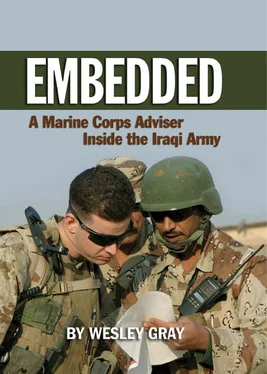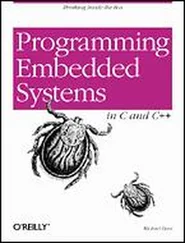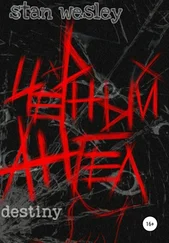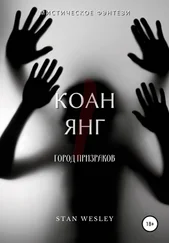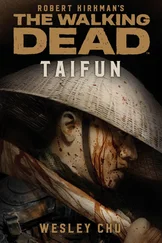Being Americans, we had everything squared away and prepared for efficiency and time management. All the Humvees and Leylands were in convoy formation prepared to move out. The way our MiTT envisioned it, the Iraqis would come off of leave, we would conduct a quick accountability of everyone, we would load the convoy, and would rush out the gate to make up for our seven-hour time deficit. Our plan did not work (see photo 9).
Iraqis are intense friends and comrades. This became evident when the arriving Iraqi soldiers exited the buses after vacation. They started hugging and kissing one another as if they were at a family reunion. Everyone was overjoyed to see their comrades. This was a good thing, but keep in mind it had only been twenty days since these guys had seen each other.
We sat in the scorching 125-degree heat in full battle-rattle for forty minutes. Waiting patiently for the Iraqis to finish greeting one another so we could actually be doing something, the boss’ patience wore thin. “Gray, tell them to get off their asses,” he said, “and get their counts so we can get the hell out of here.” I responded, “Sir, I spoke to Captain Chin, and he said we have to wait this one out and let the dust settle.” Exhausted, he replied, “Roger, well kick them in the asses to get them rolling—this is ridiculous!”
I went up to Abdulrachman, the Iraqi administrative chief, and asked if he could start taking a roll call so we could load the Leylands and return the jundi to their respective bases in the Triad. He responded in his standard asinine fashion, “We are working on it.” I pondered different methods of engagement with Abdulrachman, since the one I was using was not working. Chin suggested talking to one of the Iraqi officers to force Abdulrachman to do his duty. Chin’s advice worked like a charm. Iraqis tend not to take orders or suggestions from an American unless you are in their inner circle—a position I had yet to attain in my short time with many of the jundi . However, Iraqis will listen to the Iraqi officers, who wield the power to take their pay or leave away from them as a form of punishment. With a credible threat behind him, Captain Natham spoke to Abdulrachman and the roll call was finally completed. The Iraqis loaded into the Leylands and we were ready to go dodge IEDs on Route Bronze.
On the return convoy our MiTT took over leadership on the operation, with the outgoing MiTT members there for guidance. I moved from Humvee driver to vehicle commander for the rearmost Humvee. As we moved north on Route Bronze, I noticed a consistent screeching on my radio. I tried to respond to the incoming radio traffic but was unable to do so. “Don’t worry about it, it’s the Chameleon—they fuck up comm [communications] all the time,” blurted Captain Chin, who saw I was struggling. Apparently the boss and Captain McShane had not received the same memo. The entire time on the radio, when I could actually hear them, it was a bitchfest: “Gray, get your comm unfucked! Gray, why aren’t you responding to my radio check?” Chin comforted me, saying, “Gray, don’t sweat it. It takes about two months for everyone on the team to understand that comm is going to suck, especially in the rear of the convoy. Until your team realizes and accepts this fact, there will be constant bitching at each other. From the sounds of your major and captain, you guys may need the entire deployment.” I chuckled and said, “I sure hope not.” Knowing I was not screwing things up gave me confidence. For the remainder of the trip I concentrated my efforts on IED awareness and gave up trying to communicate on the radio.
Our first stop was the Baghdadi MHC, a residential compound protected by Colonel Shabam’s police foot soldiers and home to the Baghdadi FOB. Unfortunately we had to stay at the MHC longer than anticipated. Shabam wanted to hobnob with our boss. As we waited hordes of Iraqi kids bum-rushed our positions. A wave of small humans ran in our direction and fear took over. Even though the kids were four hundred meters off when they saw us approach, their collective voices yelling, “Mister, Mister, give me, give me, give me” could be heard for miles. Where was Santa Claus when you needed him?
Iraqi people in general, and Iraqi children in particular, believe Americans have infinite wealth and infinite possessions. If we did not give them everything we owned, we were considered stingy. The kids wanted everything from your pen or your last water bottle in the Humvee to your M-4 assault rifle or the Humvee itself. (Yes, one of the younger boys asked me for my Humvee and told me to get a new one.)
Doc McGinnis and I had a crowd of ten kids surrounding us, picking on our gear as though we were zoo specimens, yelling at us to give them everything we owned. The next thing I knew the jundi came to our rescue. They swooped in. Samir yelled, “Get the fuck out of here, before I kick your little asses!” The kids scattered like flies.
Samir explained to me in broken English spliced with Arabic, “Seyidi [Sir], you need to let these kids know minu il masuul [who is boss] or you will have them on you all day. Bil [In] Basra, I would beat these kids if they begged for things. They have fathers and mothers whom to ask for things. They beg minek, besebeb inta Americii [from you because you are American].” Samir was right.
Samir, Barak, Karim, Hydr, and Muhanned lectured Doc and me on the realities of Iraqi children and the mistaken view we had regarding their innocence. The jundi tempered my vision that Iraqi children are innocent blank sheets ready to become freedom-loving democrats. I realized I was dealing with ten-year-old kids with doctoral degrees from the school of hard knocks. My focus was so much on winning hearts and minds that I forgot these kids only cared about survival. They were begging us for things because they thought they could swindle us into giving them something. Afterward they would go to their friends and brag about how they outsmarted an American. It was all bullshit. Naïve generosity is a sure way to appear as a fool in Iraq.
The boss returned. We mounted the Humvees and continued north to Haqliniyah along Route Bronze. We completed our bus stop at Haqliniya and rushed to Camp Ali. We still had to swap out jundi in Haditha and Barwana before we could do the return trip to Al Asad so the jundi could catch the bus to Najaf.
Once we completed a hasty security check of all the jundi going on leave at Camp Ali, we stuffed the Leylands and raced to Al Asad before dusk settled on the area (see photo 10). We made it to Al Asad in record time, offloaded the Iraqi soldiers due for Najaf, and quickly turned around for Camp Ali. Remarkably, we made it home by 2300 with all limbs intact. Il hamdu Allah (Thanks be to God). The team was exhausted and emotions were getting squirrelly.
Our first leave mission really opened our eyes to the realities of working with the Iraqi army and the monumental challenges we faced. No amount of firsthand stories or Iraqi culture briefs can prepare anybody for the levels of ineptitude, laziness, and lack of motivation rampant in the Iraqi army. The frustration within our team was mounting. I was more worried about seeing a friendly fire incident within our team than I was about an insurgent ambush.
Despite my disappointments with certain adviser team members, following the stress, chaos, and hysteria of the leave convoy I had a chance to sit down with one of the great warriors in the Iraqi army, Captain Hasen. As an eleven-year veteran of the old regime army, Hasen was a proud Iraqi, faithful Shia Muslim, and dedicated family man. He was built like a small bull, with a broad chest and shoulders, a Santa Claus stomach, and a friendly smile. Hasen is also one of the few jundi who speaks outstanding English, something many of us on the MiTT appreciated.
Читать дальше
